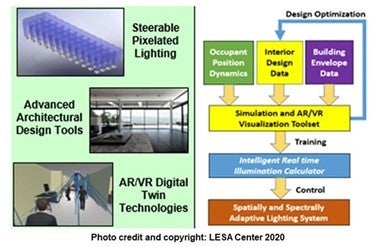
The Department of Energy announced February 10, 2020 – $74 million awarded for 63 selected projects to, ‘research, develop, and test energy-efficient and flexible building technologies, systems, and construction practices to improve the energy performance of the Nation’s buildings and electric grid.
The LESA Center will receive over $2.8M to develop hardware and software for spatially adaptive, occupant aware tunable lighting and associated control systems. The project aligns with the DOE initiative of reducing energy consumption to American’s 125 million residential and commercial buildings, which use more energy than any other sector according to the DOE’s estimates. LESA’s researchers will work closely with Rensselaer’s Center for Architecture Science and Ecology (CASE), LESA industry member Lumileds, LLC and and architectural design firm HKS, Inc. to develop and test an entirely new platform for automated steerable lighting design and control that requires little or no human engagement. Rather “sculpted” lighting profiles will be generated automatically to minimize lighting energy use, optimize light quality and ensure that the right type of illumination is automatically delivered to occupants in real time.
The system uses LESA’s new, privacy-preserving occupant position and pose detection technologies for broad Occupant Centric Control (OCC) of a range of building systems. Perhaps more importantly, the beam steering lighting fixtures combined with new occupancy sensing platforms and VR/AR design and commissioning tools will give architects powerful new design tools for enhancing their ability to create modern, energy efficient buildings.
Contact Leah Scott (scottl2@rpi.edu) to learn more about the award and the occupancy centric research being conducted at LESA.

